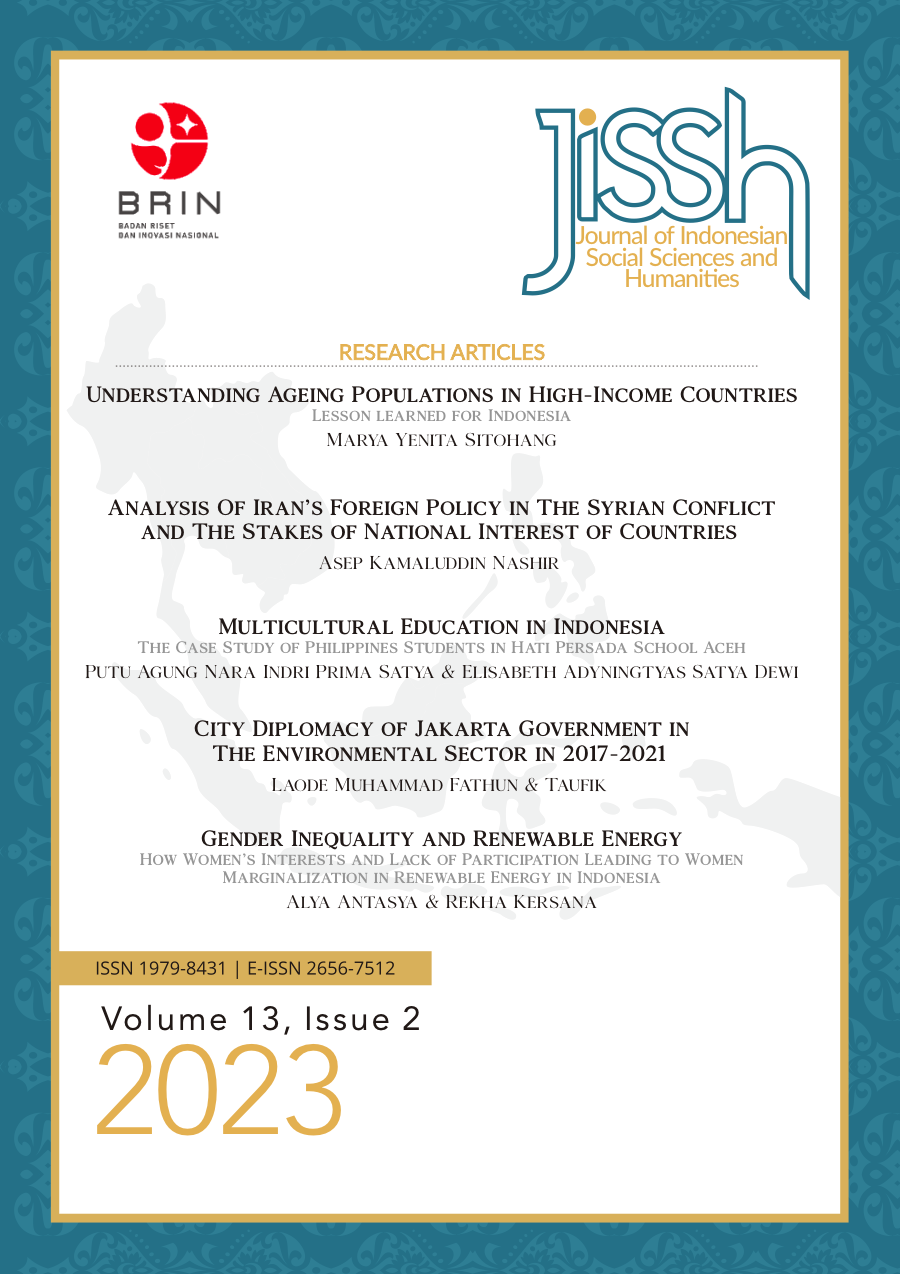Multicultural Education In Indonesia: The Case Study of Philippines Students in Hati Persada School Aceh
Keywords:
Multicultural education, peace education, cultural diversity, Hati Persada School, foreign studentsAbstract
The Hati Persada School in the Nanggroe Aceh Darussalam province is one of the few educational institutions in Indonesia that implementing the peace education in Indonesia. The peace-based curriculum is practiced both in the classroom and the outside activity. Furthermore, this school got an opportunity to accept students from Philippines as their first batch of foreign students. However, the interaction between the Philippines students with local students and teachers faced many difficulties in regard of the cultural and value differences despite the peace-based principles. This research describes the interaction and learning pro[1]cess experienced by students from Philippines in the Hati Persada School and also from the local students and teachers. This article uses qualitative methods with the multicultural education approach and intercultural communication concepts to analyze the adaptation process and the primary data form the interviews and observation within the school environment. One of the findings from this research is that cultural factors often become a barrier to adaptation both for Philippines students and their local counterparts because the lack of experience in the multicultural interactions.
References
Banks, J. A. (2009). Multicultural education: Dimensions and paradigms. In J. A. et.al, & J. A. Banks (Ed.), The Routledge International Companion to Multicultural Education (p. 9). New York: Routledge.
Banks, J. A. (2016). Cultural Diversity and Education: Foundations, Curriculum, and Teaching. New York: Routledge.
Banks, J. B. (2016). Multicultural Education : Issues and Perspectives. Hoboken: Wiley & Sons.
et.al, A. B. (2017). Blueprint Sekolah Hati Persada 2017. Jakarta: Yayasan Hati Persada.
et.al, A. B. (2017). Statuta Sekolah Hati Persada. Jakarta: Yayasan Hati Persada.
Hoon, C. H. (2013). Multicultural citizenship education in Indonesia: The case of A Chinese Christian School. Journal of Southeast Asian Studies, 44(03), 490 - 510. doi:DOI: 10.1017/S0022463413000349
Hoon, C. Y. (2008). Chinese identity in PostSuharto Indonesia. Brighton: Sussex Academic Press.
Hoon, C. Y. (2011). Mapping ‘Chinese’ Christian schools in Indonesia: ethnicity, class. Asian Pacific Education Review(12), 403 -411. doi:10.1007/s12564-010-9144-7
Indra, P. A. (2017). Maute Group dan Jaringan Keluarga dalam Kelompok Islam Radikal di Filipina Selatan. Jurnal Ilmu Hubungan Internasional, 187-200.
Jakarta, P. U. (2018). Pelita yang Meredup: Potret Keberagaman Guru di Indonesia. Jakarta: PPIM UIN. Retrieved from https://ppim.uinjkt.ac.id/category/2/post/survei-ppim-2018:-menyibak-intoleransi-dan-radikalisme-guru
Panggabean, S. R. (2015). Manajemen Konflik Berbasis Sekolah. Jakarta: Pusaka Alvabet.
Panggabean, S. R. (2016, June 17). Tirto.id. (Y. D. Putu Agung Nara Indra, Interviewer) Retrieved October 21, 2018, from www.tirto.id: https://tirto.id/terlalu-naif-kalau-tanpa-uang-tebusan-bliy
Raihani. (2012). Report on multicultural education in pesantren. Compare: A Journal of Comparative and International Education, 42(4), 585 - 605. doi:http://dx.doi.org/10.1080/03057925.2012.672255
Ting-Toomey, S. L. (2012). Understanding Intercultural Communication. New York: Oxford University Press.
Ainna, A. F. N., Putri, S. A. K., Amiruddin, Yapid, B. M., Burhanuddin, & Nurdin, N. H. (2019). Multicultural education and student tolerance at Islamic senior high school in Bali, Indonesia. International Journal of Innovation, Creativity and Change, 9(11), 77–88.
Anwar, K. (2021). MULTICULTURAL EDUCATION IN PANCASILA VILLAGE AND MODERATION OF DIVERSITY IN INDONESIA desa Pancasila, Pendidikan Multikultural. Jurnal Pendidikan Islam, 4(2), 2021. http://e-journal.ikhac.ac.id/index.php/NAZHRUNA/
Cathrin, S., & Wikandaru, R. (2023). Establishing multicultural society: Problems and issues of multicultural education in Indonesia. Jurnal Civics: Media Kajian Kewarganegaraan, 20(1), 145–155. https://doi.org/10.21831/jc.v20i1.59744
Harjatanaya, T. Y., & Hoon, C. Y. (2020). Politics of multicultural education in post-Suharto Indonesia: a study of the Chinese minority. Compare, 50(1), 18–35. https://doi.org/10.1080/03057925.2018.1493573
Jayadi, K., Abduh, A., & Basri, M. (2022). A meta-analysis of multicultural education paradigm in Indonesia. Heliyon, 8(1), e08828. https://doi.org/10.1016/j.heliyon.2022.e08828
Nakaya, A. (2018). Overcoming ethnic conflict through multicultural education: The case of West Kalimantan, Indonesia. International Journal of Multicultural Education, 20(1), 118–137. https://doi.org/10.18251/ijme.v20i1.1549
Noor, A. F. (2019). Multicultural Education Based in the Local Wisdom of Indonesia for Elementary Schools in the 21st Century. Journal of International Social Studies, 9(2), 94–106. http://www.iajiss.org
Rahman, F., Ruswandi, U., & Erihadiana, M. (2021). the Strategy of Developing. Cendekia: Jurnal Kependidikan Dan Kemasyarakatan, 19(2), 373–387.
Rahmawati. Yeni; Yi-Fong, Pai; Chen, H. (2014). The Necessity of Multicultural Education in Indonesia. International Journal of Education and Research, 2(10), 317–328.
Rosyad, A. M. (2020). the Integration of Islamic Education and Multicultural Education in Indonesia. Al-Afkar, Journal For Islamic Studies, 3(1), 164–181. https://al-afkar.com/index.php/Afkar_Journal/article/view/87
Downloads
Published
Issue
Section
License

This work is licensed under a Creative Commons Attribution-ShareAlike 4.0 International License.
Authors who publish with this journal agree to the following terms:
1. Authors retain copyright and grant the journal right of first publication with the work simultaneously licensed under an Attribution-ShareAlike 4.0 International (CC BY-SA 4.0) license. This license allows others to remix, adapt, and build upon the work, as long as they credit the author and license their new creations under the same terms.
2. Authors may enter into separate, additional contractual arrangements for the non-exclusive distribution of the journal’s published version of the work (e.g., posting it to an institutional repository or including it in a book), provided there is an acknowledgment of its initial publication in this journal.
3. Authors are permitted and encouraged to post their work online (e.g., in institutional repositories or on their personal website) prior to and during the submission process, as this can lead to productive exchanges and increase citations of the published work (See The Effect of Open Access ).


















